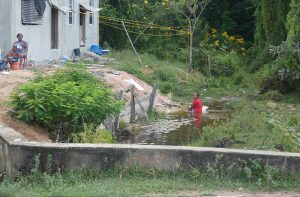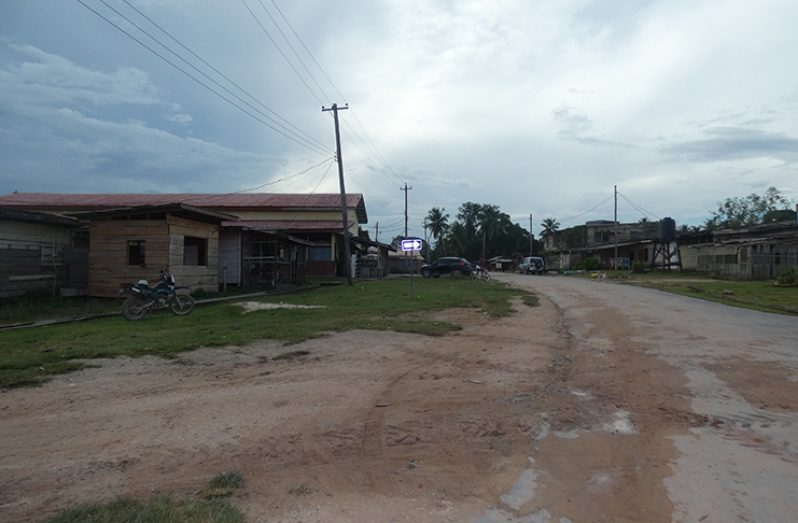– talking the good ol’ days with Godfrey Hartman
ENCLOSED by the deep rugged vegetation, savannahs and the tranquil Upper Berbice River is the community of Kwakwani.
It’s a name birthed out of bauxite mining and its economy built from the bauxite company, Berbice Mining Company (BERMINE) in the early 1900s.
It is a small, quiet and peaceful community, where residents remain united, being a brother’s and sister’s keeper, especially during hard economic times.
Kwakwani is home to over 4750 residents who became offspring of bauxite workers, after the closure of the company in the early 2000s.

During the days of the bauxite company, life in Kwakwani was sweet. Money was circulating, and family heads lived without the anxiety of wondering how to provide for their wives and children. Cost-of-living was also low, and groceries and other necessities were affordable. The company also subsidised certain services in the town, and through the construction of the Kwakwani Hospital, healthcare was also of a high standard.
The company also took in groceries to the community, and they were made available at what was called the Commissary, thereby enabling residents to purchase them at very affordable prices.
CLEAN FUN
Sports was also very popular back in the days, and residents used this as a means of coming together, enjoying each other’s company through clean fun. The only challenge back then was transportation, as it was not as readily available as it is today.
To get to Linden and the capital, residents used to have to jump on the community’s lone Land Rover. This was before the first minibus began servicing the community back in 1982.
Godfrey Hartman, a veteran bauxite worker who served BERMINE for close to three decades, described those days as the best days of Kwakwani; a time when life was easy and there were so many reasons to smile. “Things were so better back then,” Mr Hartman recalled. “Money used to circulate because the company was here. We used to live better; look out for each other. If you are not home, persons used to pick up your clothes. Everybody used to live as brother and sister.”
Those were the days of the famous ‘National Co-op Bank’, which was later closed down, following the closure of BERMINE.
In the early 2000s when the company closed its doors, Kwakwani began to expand more as it was no longer managed by the company. There are now five constituencies, namely: Lamp Island, Kwakwani Water-front, Kwakwani Park, Jonestown and Rosemary Avenue.
CLOSURE

After the closure of the bauxite company, a handful of residents began working with LINMINE, which was based in Linden. Others turned to logging, fishing and hunting to supplement their income, while yet others journeyed to the gold bushes in search of work and some became entrepreneurs.
Today, employment is still an issue in Kwakwani, but some opportunities have opened up through the Regional Democratic Council (RDC) and Neighbourhood Democratic Council (NDC) offices, whereby 27 teachers and 40 nurses work at the schools and hospital, and a small percentage of residents are employed at RUSAL at Aroaima and 62 are employed at Kwakwani Utilities Inc., (KUI).
Kwakwani has since seen some measure of development with the establishment of the Kwakwani Market, a gas station, three hotels, and a few restaurants, cook shops and bars. While there are limited recreational facilities, youths remain engaged in sports.
The Kwakwani basketball and football teams continue to make headlines for their many successes, but development however remains stagnated with limited circulation of funds.
There are no paved roads in Kwakwani, the hospital is in dire need of an upgrade, and the supply of water and electricity is not dependable.
FORGOTTEN COMMUNITY
Residents believe that the community has been forgotten by relevant authorities, as the same issues that have been plaguing them years back continue to affect them presently. Saskia Conway said that of all the places she’s lived in Guyana, Kwakwani is by far the most beautiful, and it’s for that reason that she returned.
She believes that development is possible, but it calls for the community leaders to have a vision and to work along with the community to have that vision materialise. She says that in this modern day and age, Kwakwani is still without a commercial bank, a modern mortuary, paved roads and other modern facilities.
Nathelyn Dequoy noted that because of the challenges residents are facing, there are a plethora of social ills facing the youths, among them teenage pregnancy and delinquency.
Despite this, however, the crime rate in Kwakwani is relatively low. Petty larceny and violence rarely occur. The challenges have not forced the residents to forget their history of unity, and while politics has destroyed some of the love among them, according to one resident, “Kwakwani will always be the place of my heart.”




.png)









